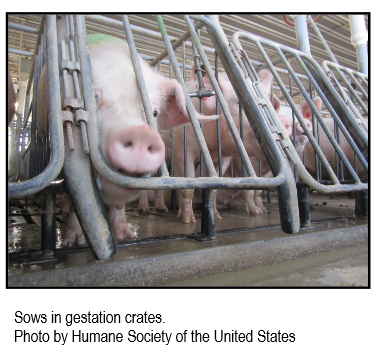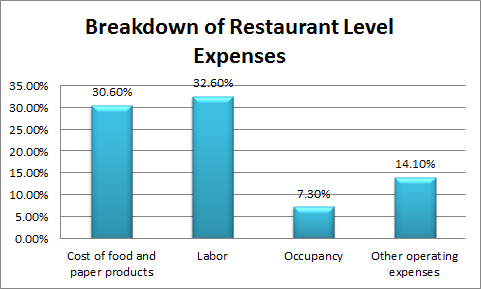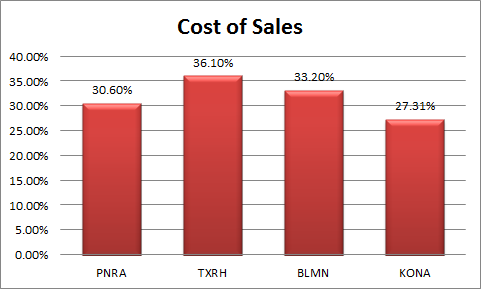Panera Bread: Marketing Flows Through Cost Of Goods Sold – Seeking Alpha
Summary
Panera released another update indicating their progress in transition to cage free eggs and pigs that are free of crates.
Investors may occasionally be worried about the impact of the cost of sales for Panera Bread.
The cost of sales is increased by using more expensive ingredients, but the use of those ingredients is a selling point for Panera.
Despite that, the cost of sales is still very competitive with other fast casual restaurants.
If you haven’t read Panera’s update on their Animal Welfare program and new commitments, you might want to check it out. Panera Bread (NASDAQ:PNRA) isn’t the only company advocating for the ethical treatment of animals, but they are one of the first restaurants to push so aggressively against the common practices.
By pushing against these commonly accepted practices Panera is able to generate goodwill with their target audience. That goodwill serves to bring in customers in much the same way as marketing expenditures. This is a recurring expense, but it is important to Panera Bread’s ability to bring in customers.
Panera Customers
I am a very frequent customer of Panera. I fit well inside their target demographics, and I regularly pay a premium for cage free eggs. I love bacon, but I don’t want to support inhumane treatment of pigs. Panera Bread pays a premium to support their stance on food and it works. I’m a more frequent customer because I feel that my purchase is voting for ethical treatment of animals. This may be a fairly common sentiment today as popular opinion has been changing.
Popular Opinion
There has been a shift in public thinking as people learned about the use of gestation crates. These pigs are in cells that are dramatically smaller for them than jail cells are for people that actually committed crimes.
This was a cost-efficient way to manage the pigs and lower cost production allows for the final product to be sold at lower prices. When Panera refuses to purchase hogs that are raised in the cheapest manner, they are forced to pay higher prices. I believe that this cost is material, but I also believe that Panera is making the right fiscal decision.
Financial Implications
Panera Bread’s commitment to better treatment of animals leads to higher costs showing up in their “cost of sales”, but it also serves as another type of marketing for the brand. I couldn’t care less how many commercials Panera Bread tries to use to reach me, but I do remember the ethical practices of the company and it does influence me to choose Panera over other options. Essentially, part of Panera Bread’s marketing campaign is flowing through the cost of goods sold. The costs of treating animals ethically will appear to be a continual drag on earnings, but marketing functions in precisely the same way.
When Companies Cut Marketing
How often have you seen a company indicate that they will “cut expenses” by not advertising? It’s fairly rare, and the one time I’ve seen it turn out remarkably well was when Monster (NASDAQ:MNST) pulled the move. I saw the decline and thought they were about to fall apart and slapped a bearish rating on them. Shortly after that shares rallied hard when it was announced that Coke (NYSE:KO) had acquired a huge chunk of the brand. Their decision to reduce their advertising commitments made perfect sense when it was revealed that they would be modifying their strategy to take advantage of Coke’s distribution system.
Essentially, what I’m suggesting is that marketing is a very important expense for the company, regardless of how the cost is recognized. The one time when it appears to be okay to slash marketing budgets is when Coke is buying a huge chunk of your company. Otherwise, investors should view a cut in marketing as a sign of pumping short-term earnings by not reducing the costs in the current period while the drop in sales will be spread across a couple periods.
Not That Expensive
When you look at the margins for Panera Bread, the impact on their cost of goods sold is not that substantial. I put together the following chart from the latest earnings release:
As a percentage of sales, the cost of goods sold is slightly over 30%. This is quite within reason and demonstrates that Panera Bread has been able to leverage their ethical stances into getting a premium on the products they sell.
Comparing Panera Bread with a few peers allowed me to create the following chart:
The comparison companies are Texas Roadhouse (NASDAQ:TXRH), Bloomin’ Brands (NASDAQ:BLMN) which owns Outback Steakhouse as well as a few other brands, and Kona Grill (NASDAQ:KONA) which offers up a mix of an American grill, sushi, and alcohol.
For the sake of fair comparisons, the two steakhouse brands are suffering higher costs in recent periods from the impact of beef prices moving materially higher during the year and their costs may shrink back down by a couple percentage points. In the case of KONA, I believe selling alcohol is a distinct advantage.
Arguments Against These Initiatives
There have been some arguments made against companies “pandering” to “animal lovers”, but this is simply Panera finding an intelligent and ethical way to target to their core demographics. The pricing power they have achieved is enough to keep their cost of goods within line with peers and that cost of goods is effectively wrapping in part of their marketing expenses. Overall this is a very well designed plan and the theory that Panera Bread is sacrificing shareholders to fulfill other goals is simply inaccurate. The shareholders are benefiting from the very strong sales figures.
Those Sales are Great
When QSR magazine compiled their annual statistics on restaurants, they found that Panera Bread was tied with McDonald’s (NYSE:MCD) for third place in average sales per restaurant. While McDonald’s is doing it with remarkably small footprints and effective drive-through service, Panera Bread’s ranking at third on the list is still fairly solid.
Conclusion
Panera Bread is announcing more progress and goals on their ethical treatment of animals and it may cause some shareholders to worry that they have been forgotten. Rather than getting bent out of shape by Panera’s commitment to animals, those shareholders may want to appreciate how effectively Panera Bread has been able to utilize their commitments as a marketing edge that allowed them to drive strong sales per restaurant and to keep a pricing premium that limited their cost of food to less than 31% during a period when many peers are struggling with higher costs.




